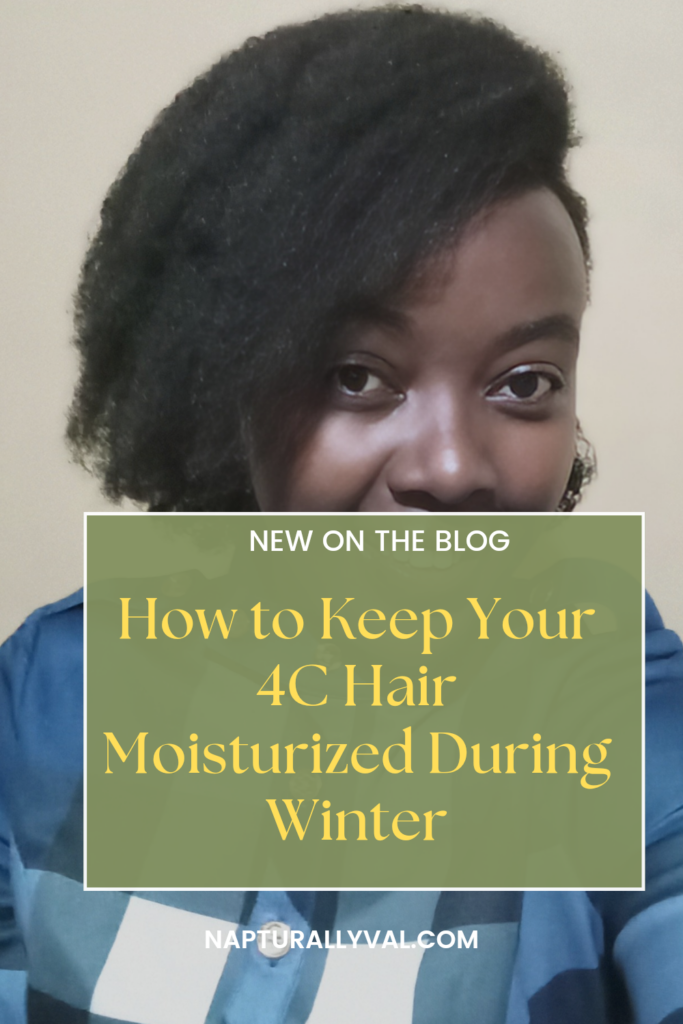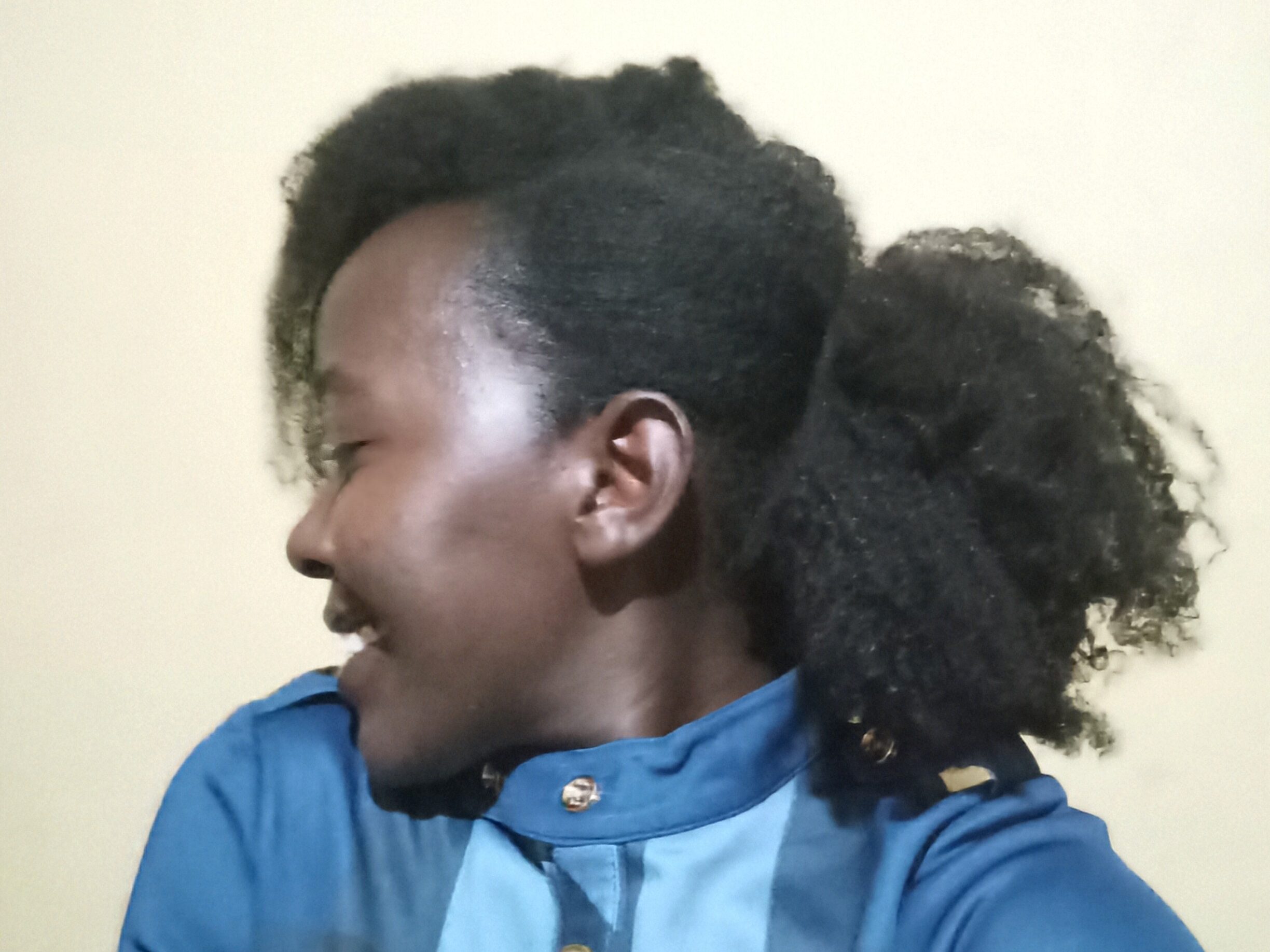Winter can be an extremely challenging season for anyone with 4C hair. The cold, dry air can zap moisture from your strands, leaving your hair brittle, dry, and prone to breakage. But don’t worry, with the right approach and a bit of extra care, you can keep your hair moisturized, healthy, and thriving throughout the winter months.
In this blog post, I’ll walk you through the best practices for retaining moisture in your 4C hair during winter, the types of products you should be using, and tips for keeping your hair protected against the harsh winter elements. Let’s dive in!
Feel like your hair has been the same length forever, I’ve an Ebook that will help you grow your hair healthier, longer and thicker. Grab your copy here… Also, check out all the Ebooks,guides and journals that will go a long way in your hair care journey here.

Table of Contents

Why Winter is Tough on 4C Hair
4C hair is naturally dry due to its tight curl pattern, which makes it harder for the natural oils (sebum) from your scalp to travel down the hair shaft. This leaves the hair more vulnerable to dryness and breakage, especially in the winter when the cold air outdoors and the dry indoor heat work together to strip moisture from your strands. The combination of these environmental factors can lead to frizz, split ends, tangling, and a general lack of manageability.
How to Retain Moisture in 4C Hair During Winter
1. Hydration Starts From Within
Before we dive into the topical products and techniques, let’s not forget that true hydration starts from the inside. In the winter, it’s easy to slack off on your water intake because you may not feel as thirsty as you do during the warmer months. However, staying hydrated is key to maintaining healthy, moisturized hair.
- Tip: Aim to drink at least 8 glasses of water a day and eat water-rich foods like cucumbers, oranges, and leafy greens to support hydration from the inside out.
2. Deep Conditioning Is Your Best Friend
Winter is the season when you need to ramp up your deep conditioning routine. Deep conditioners and hair masks provide intense moisture and help fortify your hair against the drying effects of cold weather. Look for products that are specifically designed for hydration and strengthening.
- Ingredients to look for: Shea butter, avocado oil, honey, and aloe vera.
- How often to deep condition: At least once every two weeks during the winter, but if your hair feels extra dry, you can do it twice a week.
- Tip: Apply your deep conditioner, cover your hair with a plastic cap, and sit under a hooded dryer or wrap a warm towel around your head. The heat helps open up the hair cuticle so the conditioner can penetrate deeply.

3. The LOC Method: Locking in Moisture
The LOC (Liquid, Oil, Cream) method is a tried-and-true technique to keep 4C hair moisturized, and it’s particularly useful during the winter.
- Liquid: This is your first layer of moisture, typically water or a water-based leave-in conditioner. Some people prefer to spritz their hair with a mixture of water and aloe vera juice.
- Oil: The oil layer helps seal in the moisture from the liquid. Opt for heavier oils like castor oil, olive oil, or avocado oil, which provide extra protection during winter.
- Cream: The cream serves as the final layer, adding additional moisture and creating a barrier against dryness. Shea butter or a rich, creamy moisturizer works wonders for sealing in all the goodness.
- Tip: Pay extra attention to your ends when applying Moisturizing products. The ends of your hair are the oldest and most fragile part, so they need extra love during the winter.
4. Protective Styles for Winter
Wearing protective styles during winter is an excellent way to reduce manipulation, retain moisture, and protect your hair from the harsh elements. Protective styles like braids, twists, wigs, and updos keep your ends tucked away and reduce the need for constant styling.
- Important note: Don’t neglect your scalp and hair while in a protective style. Make sure to regularly moisturize your scalp and the hair underneath to prevent dryness and breakage.
- Tip: When wearing protective styles, avoid styles that are too tight as they can lead to tension and breakage along the hairline.
5. Avoid Frequent Shampooing
Shampooing too often during the winter can strip your hair of its natural oils, leading to even more dryness. Instead of washing your hair with shampoo every week, consider co-washing (washing with a conditioner) or stretching your shampooing to every two weeks. When you do shampoo, opt for a sulfate-free, moisturizing shampoo that won’t leave your hair feeling stripped.
- Tip: Look for shampoos with ingredients like aloe vera, coconut oil, and glycerin that will help retain moisture.

6. Hot Oil Treatments for Extra Nourishment
Hot oil treatments are perfect for winter as they help to deeply nourish the scalp and hair, locking in moisture and adding shine. You can use oils like olive oil, coconut oil, or argan oil for your treatment.
- How to do it: Warm your chosen oil (but don’t make it too hot), and apply it to your scalp and hair. Cover your hair with a plastic cap and leave the oil in for 30-45 minutes. You can use a steamer or a hot towel to add extra heat, which will help the oil penetrate better.
7. Humidifier for Indoor Moisture
One of the sneakiest culprits of dry winter hair is indoor heating. The dry air indoors can suck the moisture out of your hair, leaving it parched and prone to breakage. A humidifier adds moisture back into the air, which helps keep your hair (and skin) from drying out.
- Tip: Place a humidifier in the room where you spend most of your time, whether it’s your bedroom or office.
8. Satin or Silk: Your Hair’s Best Winter Ally
Satin or silk fabrics are essential for retaining moisture in your hair, as they don’t absorb moisture like cotton. During the winter, it’s especially important to protect your hair with satin or silk:
- Sleep on a satin/silk pillowcase: This will reduce friction and help retain moisture in your hair overnight.
- Wear a satin/silk scarf under your winter hat: Wool and other rough fabrics can snag and dry out your hair, so always wear a satin scarf underneath your hats for extra protection.

9. Moisturize Daily or As Needed
4C hair thrives on moisture, and in winter, you might need to add a bit more moisture to your routine than usual. Keep a water-based moisturizing spray on hand and spritz your hair whenever it feels dry. Follow up with an oil to seal in the moisture.
- Tip: Pay attention to how your hair feels throughout the day. If it starts to feel crunchy or dry, that’s your cue to re-moisturize.
10. Trim Your Ends Regularly
Dry, brittle ends are more prone to splitting and breakage, especially in winter. Regular trims help prevent this from happening and keep your hair healthy and full. Even though trimming might seem counterproductive when you’re trying to retain length, it’s a crucial step to maintaining healthy 4C hair in the long run.
Best Winter Moisturizing Products for 4C Hair
- Leave-in Conditioners: Look for moisturizing leave-ins with ingredients like shea butter, coconut oil, and aloe vera.
- Deep Conditioners: SheaMoisture’s Raw Shea Butter Deep Treatment Masque or TGIN Honey Miracle Hair Mask are excellent choices for deep moisture.
- Oils: Jamaican black castor oil, avocado oil, and olive oil are great for sealing in moisture.
- Creams/Butters: Shea butter, mango butter, or thick creams like the As I Am Double Butter Cream work wonders for adding moisture and sealing it in.
Winter doesn’t have to be the enemy of your 4C hair! With the right techniques and products, you can keep your hair moisturized, healthy, and happy all season long. Remember, hydration is key, so focus on deep conditioning, protective styling, and sealing in moisture with the LOC method. Make winter your friend by adapting your hair routine to fit the season, and your 4C hair will thrive year-round.



